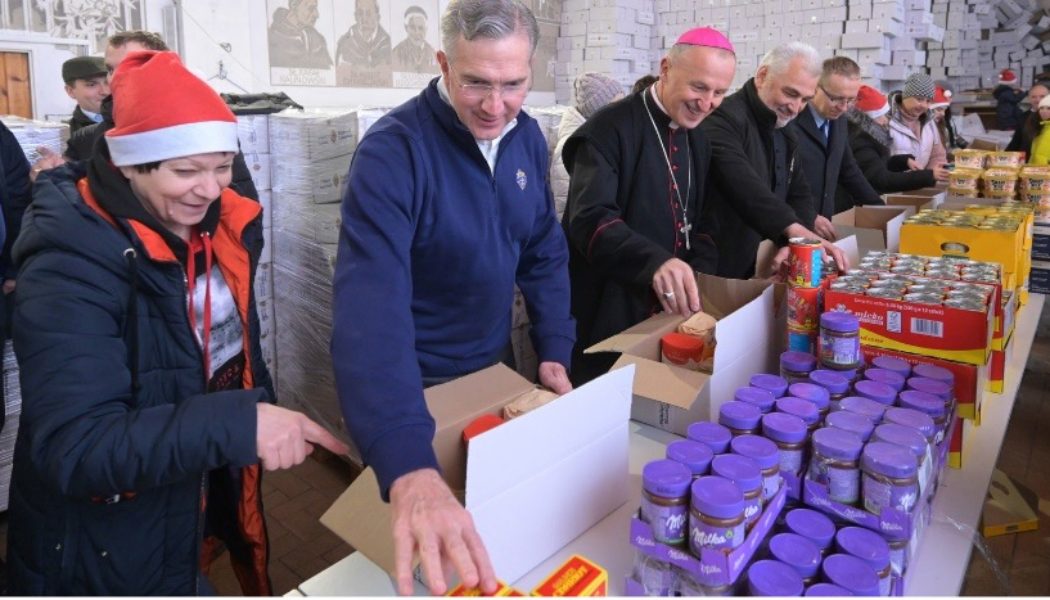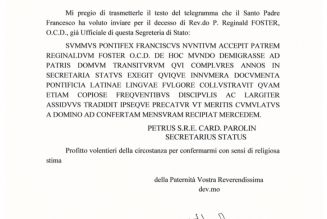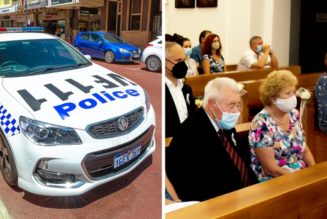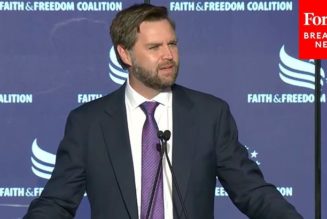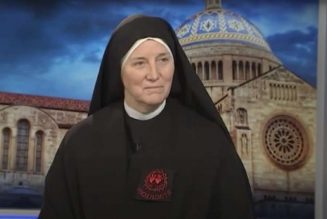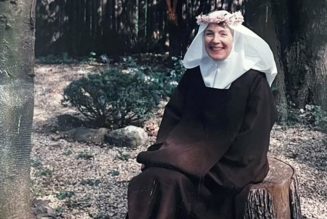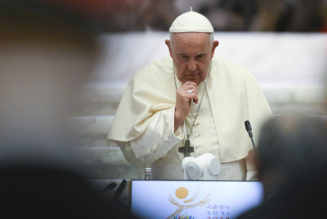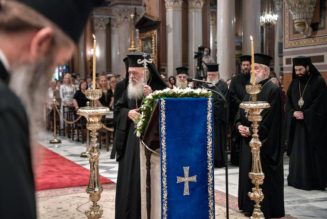Supreme Knight Kelly gives an early St. Nicholas Day present to a Ukrainian refugee child at the Church of St. Clement Hofbauer in Warsaw on Dec. 2. Redemptorist Father Andrzej Kukła (left) and local Knights operate a Knights of Columbus Mercy Center at the parish, hosting refugee women and children in need. (Photo by Tamino Petelinšek)
“The reason I went to Ukraine, the reason I wanted to go during Advent, was because Christmas is approaching, and I knew that for many Ukrainians it was going to be a very difficult Christmas,” said Supreme Knight Patrick E. Kelly of the Knights of Columbus. Kelly recently returned from a visit to Ukraine and Poland.
During the course of the trip, he met with Polish government leaders, including Polish President Andrzej Duda, local members of the Knights of Columbus, Church leaders, and Ukrainians displaced by the war. Summarizing the purpose of the trip, Supreme Knight Kelly said, “I wanted to go because I wanted to deliver the message in person that you are not alone; we hear you, we are with you and we are going to stay with you for as long as it takes.”
To date, the Knights of Columbus has raised nearly $20 million, and through the efforts of the thousands of members in Poland and Ukraine, has distributed more than 3.2 million pounds of food to those in need.
Upon returning home, the Supreme Knight met with Our Sunday Visitor to share his experience abroad. This interview has been edited for length and clarity.
Blackouts and changing needs
Our Sunday Visitor: What did you make of the spirit of the Ukrainian men and women that you met while you were abroad?
Supreme Knight Patrick E. Kelly: The Ukrainians are a very courageous and resilient people. I think they’re very tough. And I think history has made them tough. This is my second trip; I was in Ukraine in April, soon after the war started, but what I experienced in this trip earlier this month was that there’s a settling in for the long haul with this war. Back in April, they weren’t really sure how long this was going to go on. But now I think they realize that this is a protracted conflict.
What’s made it worse now is that the Ukrainians are being deprived of power. The Russians are hitting the power grid in eastern Ukraine, but that’s causing rolling blackouts in western Ukraine as well. I experienced some of those blackouts on my recent trip. At one point we were at the Ukrainian Greek Catholic Seminary in Lviv in the evening, and I was going to get up and give the men a talk. And then the power went.

A Ukrainian volunteer directs Supreme Knight Kelly and others (from left, Bishop Stolarczyk of Radom, Poland; Father Wiesław Lenartowicz, pastor of Our Lady of Częstochowa Parish in Radom and associate state chaplain; and State Deputy Krzysztof Zuba) in assembling Knights of Columbus care packages bound for Ukraine. (Photo by Tamino Petelinšek)
So you’re plunged into darkness, and it’s a very tense situation. The Church has done enormously good work there. They have taken in refugees in spare rooms at seminaries, in spare rooms in convents. They’ve done just really heroic work for these refugees. I visited with a number of these refugees, and they’ve been there for months. I mean, some of the ladies I spoke with had been there for six months, eight months. They said their homes were destroyed, their husbands are on the Eastern Front. They haven’t seen their husbands and often they’re with their young children all living in one room. It’s a deeply challenging situation.
Our Sunday Visitor: Of course their needs are changing as they face winter. What were some of the pressing needs that you saw?
Kelly: We, the Knights of Columbus, have sent many care packages. I suspect for many refugees, those packages will be their Christmas presents this year. Since the outbreak of the war, we’ve continued to move supplies into Ukraine.
One of the most recent initiatives is providing generators. That is a pressing need because of the power outages I just mentioned. At one point we visited a homeless shelter run by the Albertine Fathers in Lviv. This was not only a shelter that serves homeless men, but these homeless men are homeless in the city that’s at war, right? It’s an especially desperate situation. But what keeps that shelter going is this Knights of Columbus generator that we’ve been able to provide. It keeps the lights on and keeps the food cooking for these men.
We’ve provided 200 generators in this initiative to parishes and to other centers that are being called warming centers where people can go to get warmed up. That’s something that we’re going to continue to work on; we’re going to provide more generators in the future.
One of the other needs is in these areas of Ukraine that Russia occupied and now retreated from, they’ve laid landmines all around. So Ukrainians are going back to their homes and their fields and there’s landmines there. We’re now working with some third parties to de-mine these areas. That’s a crucial thing not only for the agrarian economy, but also because children are the ones who are most often hurt by landmines. As they’re playing, you know, they step on them and trigger them. Those are some of the more recent initiatives that we have undertaken in addition to the care packages.
An increase of faith
Our Sunday Visitor: Part of the great difficulty of a humanitarian crisis like this, it seems to me, is how it weighs on people, emotionally, psychologically, spiritually. We can provide for people’s physical needs. We can send coats, generators and care packages. But what about the Knights who are in Ukraine? What’s being done for their fraternal support, to nourish them spiritually?
Kelly: There’s a surprisingly good spirit among the Knights in Ukraine and in Poland. You know we’re not an aid agency. We don’t drop in and have to figure out what we can do. We have people on the ground. We have families in these communities; they know exactly how to get the aid we send to where it needs to go. When I was talking with Knights in Ukraine, I found them to be very enthused about their mission.
I told them that the history of the Knights of Columbus in the United States was written through times of war, World War I, World War II and the Cold War. They are now writing the next chapter in the history of the Knights of Columbus in their country at war. Among the Knights, there is a strong sense of solidarity. It was very inspiring to see.
The refugees that I met with are really suffering. And in that suffering many of them are turning to the Lord; they’re turning to prayer. For decades Ukraine was a communist nation. It was in the orbit of the Soviet Union, but now there is a real emergence of faith that this crisis has brought out.
I spend a lot of time with the Roman Catholic Archbishop of Lviv. And I have spent a lot of time with the Archbishop of the Ukrainian Greek Catholic Church, Archbishop Shevchuk. They both said that people are turning to God in this crisis, and interestingly, they told me that government leaders have come to them and thanked them for giving the Ukrainian people hope. So amid this great evil, there’s also light.
Hearing sirens
Our Sunday Visitor: In addition to the great humanitarian needs that you saw, what were other signs of the war that you experienced during your trip? You mentioned blackouts. Did you see military convoys? Did you hear air raid sirens?
Kelly: All around the city of Lviv, there are sandbags. Buildings have sandbags around them, with first floor windows filled with them. The Roman Catholic Cathedral is all boarded up; the windows have been boarded up to preserve the stained glass. And the statues … both the interior of the cathedral, but also the exterior, are all wrapped in this kind of protective wrap, so in case there’s a missile strike the statues will remain intact.
One of the more dramatic things I experienced was an air raid siren. We had just arrived back to where we were staying, and a security agent who was with us told us that the Russians had launched 70 missiles into Ukraine. So he said very soon you’ll start hearing the sirens, and sure enough, the air raid siren goes on. It takes you aback when you hear that, you know.
Churches have opened up areas underground. The Archbishop of Lviv has an underground bunker. When the people hear the air raid siren, they go right into that bunker. It’s a very precarious situation to live in … you don’t really know what your day is going to be like in a wartime situation.
The work in Poland
Our Sunday Visitor: With a complicated history between the Eastern and Western churches, did you see on the ground any signs of ecumenical promise? Was the Catholic Church locally working alongside or aiding Orthodox initiatives?
Kelly: The Roman Catholic Archbishop of Lviv and the Ukrainian Greek Catholic Archbishop are working together. We had an event and they were both with me; there’s a challenging history in that relationship, so this cooperation is not insignificant. I think there is some reconciliation, some healing, some coming together.
The other area where I saw a significant reconciliation is between the Polish people and the Ukrainians. There is a challenging history, going back 100 years. But when we were in Poland, we were at a center that was preparing care packages for refugees. And in that center, they were working alongside one another, Poles and Ukrainians. Ukrainian refugees were working side-by-side, shoulder to shoulder, and that’s a very significant thing.

President Andrzej Duda of Poland receives the Knights of Columbus Caritas Award from Supreme Knight Patrick Kelly on Dec. 2. Following a private meeting at the Presidential Palace, the supreme knight bestowed the honor on the president and the people of Poland, recognizing their exemplary charity toward the suffering people of Ukraine. (Photo by Jakub Szymczuk/KPRP)
I had a meeting with the President of Poland during the trip, and I thanked him for everything that the Polish people have been doing for refugees. One of the things that he said, he and every single Pole I talked to, they’re very proud of the fact that there are no refugee centers in Poland. Even today. The Polish people have opened up their hearts and their homes to refugees. I mean, it’s one thing to have a houseguest for a week; It’s another thing to have a houseguest for eight months, you know?
I awarded the President of Poland the Caritas Award, which is an award that the Knights give for exemplary service and charity. I presented President Duda with that award, for which he was very grateful. But I also gave him a relic of Blessed Michael McGivney. In the presidential palace in Warsaw, they have a chapel — imagine if we had a chapel in the White House — they have this extraordinary Catholic chapel in the presidential palace, so I gave him a relic of Blessed Michael J. McGivney, because he founded the Knights in particular for the care of widows and orphans. That’s so much of the work that they’re doing right now in Poland; caring for these very vulnerable women and their children.
Our Sunday Visitor: Christmas is a privileged time for families. As father of three young children, did you talk to your daughters about the trip? What did you tell them?
Kelly: I told them about the war. Particularly when I got back, I told them what it was like for all the mothers and their children living in little rooms. They’re living in storage rooms in many places, you know. They’ve been there for months. I told them that we really need to remember how, fortunately, our country’s not at war but we need to pray. I told them that we need to pray for these people who are really suffering and who haven’t seen their fathers now in many months. I was gone for 10 days, but I told them, many of these young children and their mothers haven’t seen their father, their husbands in 9 months. I tried to make it real for them.
To support the humanitarian efforts of the Knights of Columbus in Ukraine, make a donation to the Ukraine Solidarity Fund, https://www.kofc.org/en/what-we-do/charity/ukraine.html.
Father Patrick Briscoe, OP, is editor of Our Sunday Visitor.
Join Our Telegram Group : Salvation & Prosperity
